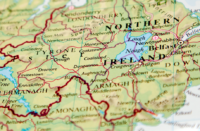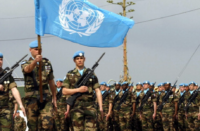Speech by John Douglas, general secretary, Mandate
at the United Wolfe Tone Commemoration, Bodenstown, 20 September 2017
Comrades, brothers and sisters,
Our national freedoms were defined by the United Irishmen in terms of citizenship, the responsibility of the state to its citizens and the responsibility of all citizens to the welfare of each other. Those freedoms were not narrow: they were based on the principles of the French Revolution: liberty, equality, and fraternity.
Wolfe Tone and the United Irishmen fought for liberty not only for Catholics but also for “Dissenters,” such as Presbyterians, Quakers, and other oppressed religious minorities.
The United Ireland of Wolfe Tone, Napper Tandy, McCracken and later Connolly was egalitarian: it made no tilt towards religion; they had no interest in a united Ireland subjugated by religion, monarchy, class, privilege, or capital.
The unification of the island of Ireland was not a geographical project of narrow nationalism, rather a unification of the disenfranchised and the impoverished against the tyranny of colonialism, British imperialism, and capital.
Clearly the vision of Wolfe Tone and the United Irishmen has not yet been fulfilled, as has not yet the vision of Connolly. The island of Ireland is divided by sectarianism, inequality, and exploitation. This did not happen by economic accident but through economic design.
Ireland has been subjugated by neo-liberalism and global capitalism; our domestic sovereignty has been sacrificed on the altar of capital. Our recent experience in the Republic of Ireland of EU-imposed austerity and the plunder of our national wealth, the stripping bare of our social provisions, should be a lesson to all, and a rallying call to all—to unite and mobilise.
Our housing crisis, our health crisis and the level of poverty and deprivation in Ireland are a direct result of the interests of global financial capital being allowed and facilitated by our government to trump the needs, well-being and rights of its own citizens.
Our weak and subservient national parliament, the Dáil, was no match for a neo-liberal federal EU, which was able to dictate that all banks were too big to fail and that Irish citizens would shoulder the burden of 40 per cent of all European bank debt, the result of which can be seen every night in the doorways of shops and the back lanes of Dublin, where thousands huddle for shelter and food, and in the cheap hotels and B&Bs where the growing numbers of homeless families are exiled to exist—out of sight and out of mind.
The phoney Brexit debate, whether in Belfast or Dublin, London or Brussels, takes no account of these homeless families or of those living in poverty; a hard border or a soft border is of little consequence to the oppressed or the marginalised. The Brexit debate will be decided within the capitalist, neo-liberal framework, which has no moral compass, as its only driving force is to protect capital and those who benefit from it.
But during the Brexit debate in the UK the narrative was often blatantly racist, fascist, and based on the notion of one race or religion being superior to another. The post-Brexit debate on this island has also often taken on a sectarian nature or indeed one of narrow nationalism. There is little or no consideration for those that the current political and economic construct has failed miserably. Too many are seeking to use the opportunity to further nationalist or sectarian interests, both here and in the UK.
In the absence of a socialist narrative and debate, the void is filled by rhetoric and division, by manoeuvring and cheap political tricks—all of which progress nothing, just deepen divisions.
Courting sectarianism, naked nationalism or supremacy of any kind is playing with the devil. As we have seen in the United States, Trump’s pandering to the far right and fascists has given them oxygen and the confidence to emerge from the bowels of humanity. What happened in Charlottesville is a direct consequence of this appeasement of racism and white supremacists. We on this island also have had our fair share of Charlottesvilles, also fuelled by hatred and prejudice.
We must fight fascism wherever we find it; we must fight supremacy and sectarianism wherever we find them—be that in Ireland, the UK, Palestine, or the US.
A new Ireland is possible, an Ireland of equals, of opportunities for all, of fraternity—a United Socialist Republic—that of Tone and Connolly. In the words of Connolly, “We are Republicans because we are Socialists.”
The Left and other progressive forces in Ireland need to unite around a clear Socialist Republican vision. We need to set out clearly what we are in favour of—just as much as what we are against. We do not have the luxury to dance on the pin heads of ideological differences.
In the UK, Corbyn was able to set out clearly the policy platform for a decent future, for a better society for all UK citizens. It was by no means radical: it spoke about a universal National Health Service, about nationalising public services, the right to a decent job, a decent home, dignity and respect.
We in Ireland on the left have not been good at this—rather we tend to divide, splinter, and attack each other rather than uniting to convince citizens of what is possible.
The mass mobilisation in the Republic of communities against water charges and the privatisation of water resources is an example of what is possible. Yes, it was about more than water charges—but water is a symbol of all life. The protests were about life, about hope, about a vision, about citizens collectively taking control and proclaiming that another Ireland is possible.
The Right2Change movement, which emerged from the water movement, attempted to bring left progressives to unite around agreed policy platforms. Over a hundred candidates in the last general election in the Republic supported the Right2Change policy platform, of which thirty-three were elected. There is an untapped hunger for change and justice in Ireland that we need to give expression to, and we can only do this through the unity of progressive forces.
The gross and pervasive inequalities that have so profoundly scarred our society are as much a result of our inability on the left to unite and to set out a clear alternative as with the political hegemony of the right, which ensures that nothing really changes and that the elite and capital are always protected.
Socialist dialogue and socialist struggle have been weak in Ireland. It was snuffed out in favour of a bourgeois nationalism.
Our task now is to build from the ground up, to educate, to agitate, not to do for those what they can do for themselves. We need to build a movement that is capable and confident and which grows with every victory—that’s why it is vital that we complete the victory in the water campaign.
I believe this is possible. I believe there is a real thirst for change and justice. As capitalism sinks further into crisis it must be the revolutionary principles of liberty, equality and fraternity which emerge triumphant.
Finally, in the words of Wolfe Tone, “we will free ourselves by the aid of that large and respectable class of the community—the men of no property.”




